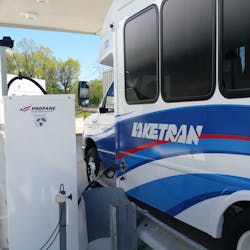Propane, test-market partnerships and the possibility of selling maintenance services are recent innovations Laketran, a suburban transit system in Lake County, Ohio, has undertaken to keep the agency’s $2.5 million maintenance operation within budget.
Propane Powers Savings
In 2015, Laketran learned Chevy would no longer manufacture the diesel chassis used for its paratransit fleet. Laketran spent much of that year evaluating options between gasoline, diesel fuel, propane and compressed natural gas. Advances in the technology of propane and its cost compared to diesel fuel made propane the best option to fuel Laketran’s 85-bus fleet.
“During our evaluation we recognized propane vehicles would reduce our purchase price, and fuel and maintenance costs,” shared Ben Capelle, Laketran’s general manager who managed the project. “However, planning was critical as we had to build the fueling infrastructure, custom design an onboard fueling system for our capacity, as well as manage the training of our operators and mechanics.”
The three-phase capital project included engineering, construction of the fueling station, and installation of indoor propane detectors for safety inside Laketran’s 122,000-square-foot vehicle storage and maintenance area.
Mentor, Ohio-based CT Consultants led the engineering effort and the construction of the fueling station was completed by Superior Energy Systems based in Columbia Station, Ohio.
Laketran’s initial test fleet was made up of Turtle Top VT3 and Terra Transit buses that seat either eight or 10 passengers.
Capelle explained that the low cost and stability of propane has helped manage costs during a time when the demand of service continues to grow.
Laketran’s paratransit service, Dial-a-Ride, has grown 14 percent over the past three years.
“Propane’s lower BTU rating results in slightly lower fuel economy, however the lower price quickly offsets the fuel economy. Our paratransit diesel buses are costing us $17.37 every 100 miles to operate, whereas our new VT3 only cost $11.18 yielding a 35 percent fuel savings,” explained Capelle.
“Maintenance savings quickly adds up when you replace fuel filters at every 100,000 miles, instead of 15,000, plus the vehicles consume less oil and there’s practically no routine maintenance to the exhaust system compared to the diesel engines “exhaust maintenance.”
In addition to fuel and maintenance savings, a propane bus cost about $6,000 less than current diesel and propane maintenance is less expensive compared to other fuel alternatives.
Another benefit of purchasing alternative fuel vehicles, Laketran will be able to capitalize on federal and state funding opportunities used to incent transit systems that use alternative fuels to help the community attain air quality standards.
Laketran has an aggressive goal to have 35 percent of its Dial-a-Ride fleet transitioned to propane with 30 propane buses on the road by end of 2018.
Community Partnerships
While transit systems traditionally partner with job centers, Medicaid providers and other community agencies to increase ridership, Laketran’s maintenance department leverages relationships with local manufactures to test-products to reduce costs. For nearly 20 years Laketran has tested lubricant additives for engine oils, driveline fluids, diesel fuel additives, and is currently testing synthetic transmission fluids and filters.
“We have vehicles that operate the same routes each day and that creates a great test market because the regular routes create a controlled, long-term environment,” explained Laketran Director of Maintenance Keith Bare. “During the testing phase, Laketran will save nearly $10,000 each year in transmission fluids and filters, while also being reimbursed for labor.”
Laketran has also had discussions with a local adhesive technologies manufacture to test market vinyl display graphics for its vehicles or bus wraps sold for advertising revenue.
Offering Specialty Maintenance Services
While the transition to propane and community partnerships are reducing costs, Laketran continues to get innovative when it comes to growing revenue, too.
After difficulty finding vendors to complete alignments on the 35-foot transit buses and 40-foot commuter coaches, Laketran decided to bring the services in-house.
“Our local vendor told us they did not want to continue to perform the service and we were driving our buses 45 minutes away and the travel time was cost prohibitive,” explained Bare.
Bare suggested Laketran bring alignment service in-house with potential to sell the services through governmental agency contracts.
“With other governmental agencies, like our county or local school districts having similar issues, we plan to sell alignment service once our maintenance department is trained and we have a general idea of how much time the alignment will take to complete,” shared Bare.
“Completing alignments on Laketran vehicles in-house, I estimate the alignment machine will pay for itself in just four years, but selling alignment service to other government agencies that operate heavy-duty vehicles would shorten Laketran’s return on the investment and could, at some point, generate revenue for the agency,” explained Bare.
Last December, Laketran purchased a Hunter Engineering three-axle alignment machine from New York-based, Mohawk Resources LTD.
New technology from Hunter Engineering provides three-axle wheel alignments with software that supports specialized truck, trailer and bus alignments to meet the needs of Laketran’s diversified bus fleet and ability to service other customized government vehicles.
Laketran aims to pilot the sale of alignment service by end of 2018.
Julia Schick is the director of communications at Laketran and can be reached via email, LinkedIn or at 440.350.1012. You can follow Laketran on Twitter at @Laketran.



